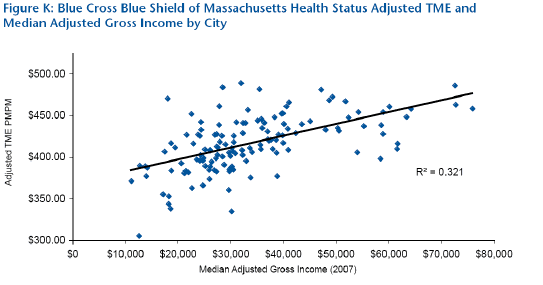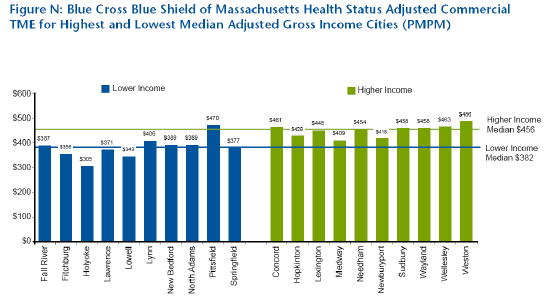Advertisement
Turnbull: On Inequality In Medical Spending And The Cost Hearings

It might be the effects of the thin air here in Colorado, but I am disappointed to be missing the second annual hearings on health care cost trends, which will take place this week. In preparation for the hearings, a flurry of reports, testimony and other material has been issued, all of which is posted on the website of the Division of Health Care Finance and Policy. Lots of interesting early morning reading for someone who hasn’t adjusted to Mountain Time.
Among the most important findings in the new reports is that medical spending is greater for people who live in zip codes with higher incomes than spending in zip codes with lower average income. This correlation was found both in the report of Attorney General Martha Coakley’s office and in one of the reports from the Division of Health Care Finance and Policy. While zip code of residence is not a perfect predictor of any individual’s income, it’s a pretty good proxy, on average.
The fact that average medical spending per person tends to be higher in higher income zip codes than in lower income zip codes, even after correcting for underlying health needs, is actually not really surprising. We know from existing research over many years that there is significant income-related inequality in medical spending in the United States. But these reports are, as far as I know, the first to document these disparities in Massachusetts. And, since the reports look only at people who have private insurance, these spending differences are not due to insurance status. (Lower-income people are more likely to not have any insurance and medical spending is much lower for uninsured people. But these reports consider only insured people with private coverage, and they also adjust spending for health status, two of the factors that would be most likely to account for differences in medical spending by income.)
Income-related inequalities in medical spending are particularly troubling because we know that people with lower incomes have higher health needs. Being a lower income person in the U.S. is bad for your health. So we would expect medical spending to be higher for people with lower incomes. Instead, it’s just the opposite. These inequalities are also cruelly ironic, since the financing of private health insurance is already so regressive: in the individual market and at most employers, the best paid person pays the same premium as the lowest paid person for the same health insurance coverage, which means that lower income people pay a higher proportion of their income for private health insurance.
So, what explains the differences? Are higher income people getting too much care-- too many elective procedures, too many imaging tests, taking too many drugs? Are they getting more of their care at expensive teaching hospitals, particularly care for which community hospitals would be a more appropriate setting? Are the doctors and hospitals that are more likely to take care of higher income people also more likely to be paid higher prices? Are people with lower incomes getting too little care or the wrong care? Is their access to the care they need impeded by the barriers that we know still affect those with lower incomes, even if they are well insured? Despite the ideologues who want consumers to have “more skin in the game,” are we seeing the regressive effects of cost sharing (i.e., the fact that lower income people are particularly sensitive to deductibles, coinsurance and copayments, which make a real difference in how much medical care they use, for both appropriate and inappropriate services)?
While the reports don’t provide the answer to these questions, my bet is that the answer to all of them is: “Yes.” But really understanding these income-related differences in medical expenditures is essential as that state considers a move towards global payments. For example, if providers that are more likely to take care of higher income people get paid higher prices, and this price disparity is ossified in global payments, as the AGO report suggests has happened in many cases so far, we will continue to disproportionately and inappropriately direct medical resources to higher income people, at the expense of lower income people, who actually have higher levels of medical need. The same will happen if higher income people are more likely to use teaching hospitals, whether they need that level of care or not, and these historic patterns of care, and higher spending, are reflected in global payments.
But understanding this inequality is not enough: we also need public policy action to ensure that our limited medical resources—both public and private-- are better matched to the health needs of populations and communities. None of us should be comfortable relying on private negotiations between health plans and providers to make these important resource allocation decisions in equitable ways—just read the AGO and DHCFP reports to find ample evidence that market forces have failed miserably to achieve fair results so far.
So I am especially disappointed to be missing the final panel of the DHCFP hearings, which will consider “The Role of Government and the Market in Reducing Health Care Costs.” Let’s hope that the panelists add “Income-Related Differences in Medical Spending” to the topics that will receive lively discussion. Even from altitude, I know that it’s unlikely that we will emerge from the hearing with a clear and unanimous call for a stronger role for government in helping to address this problem. But no issue deserves more careful consideration and attention as the state considers how to reform provider payment.


(source: Division of Health Care Finance and Policy, Massachusetts Total Medical Expenses: 2009 Baseline Report)
This program aired on June 26, 2011. The audio for this program is not available.
